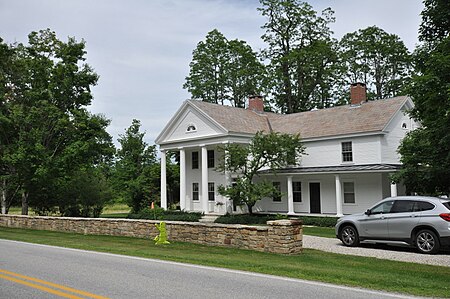Hard Farm Homestead
Buildings and structures in Manchester, VermontFarms on the National Register of Historic Places in VermontGreek Revival architecture in VermontHouses completed in 1804Houses on the National Register of Historic Places in Vermont ... and 1 more
National Register of Historic Places in Bennington County, Vermont

The Hard Farm Homestead, also known as the Zera Hard House, is a historic farm complex on River Road in Manchester, Vermont. Consisting of an early 19th-century Cape, an 1840s Greek Revival house, and a number of 19th-century outbuildings, it represents a rare surviving assemblage of farm buildings in the town. It was listed on the National Register of Historic Places in 1988.
Excerpt from the Wikipedia article Hard Farm Homestead (License: CC BY-SA 3.0, Authors, Images).Hard Farm Homestead
River Road,
Geographical coordinates (GPS) Address Nearby Places Show on map
Geographical coordinates (GPS)
| Latitude | Longitude |
|---|---|
| N 43.130277777778 ° | E -73.082222222222 ° |
Address
River Road 835
05255 (Manchester)
Vermont, United States
Open on Google Maps







